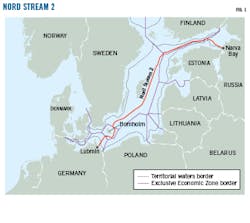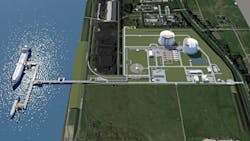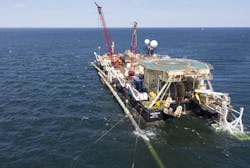Nord Stream 2’s progress remains uncertain
Uncertainty has clouded the future of Nord Stream 2, a natural gas pipeline that would increase the amount of Russian gas exported directly to Germany and on to other European Union (EU) member countries, bypassing Ukraine and other transit states (Fig. 1). Pipeline construction was suspended in December 2019, after passage of US legislation establishing sanctions related to it. The Trump Administration and Congress have expressed opposition to Nord Stream 2, reflecting concerns about European dependence on Russian energy and the threat Russia poses to Ukraine.
About 100 miles of the roughly 760-mile pipeline remain to be laid and connected, all in Denmark’s Exclusive Economic Zone. After several months of delay, in May 2020 a Russian pipelaying vessel, Fortuna, arrived at Germany’s Mukran port, a logistics hub for Nord Stream 2. Observers have expected Russian state-owned Gazprom to use that ship—which until recently was owned by a subsidiary—and a second vessel (Akademik Cherskiy) to try to finish the pipeline. As of Oct. 5, 2020, Fortuna was moored at Wismar port, Germany, and Akademik Cherskiy en route from Mukran to Kaliningrad, Russia, vessel tracking data showed. Russian officials have said the pipeline could be completed by end-2020 or early 2021.
Background
Nord Stream 2 will run parallel to the Nord Stream 1 pipeline, in operation since 2011. If completed, Nord Stream 2 would double the system’s total capacity, from 55 billion cu m/year (bcmy) to 110 bcmy. Nord Stream 2 is estimated to cost about $10 billion. It is owned entirely by Gazprom. Half the cost is being financed by five European companies: Engie SA (France), OMV (Austria), Royal Dutch Shell PLC (Netherlands, UK), Uniper SE (Germany), and Wintershall Holding GMBH (Germany). This ownership structure differs from Nord Stream 1, in which Gazprom has a 51% stake and four European companies—Engie, Wintershall, E.ON SE (Germany), and NV Nederlandse Gasunie (Netherlands)—own the rest.
Support, opposition
Although the EU has articulated an energy diversification strategy, some European governments have not reduced dependence on Russian gas, which accounted for 47% of EU gas imports in 2019. Factors behind continued European reliance on Russian supply include possible rising demand for natural gas, diminishing European gas supply, financial investments by Russia in European infrastructure, and the perception of many Europeans that Russia remains a reliable supplier.
Supporters of Nord Stream 2, including the German and Austrian governments, argue that the pipeline will enhance EU energy security by increasing capacity of a direct and secure supply route at a time of rising European demand for gas. Once the gas reaches Germany it could be transported throughout Europe. These advocates say they support developing additional infrastructure to ensure this is possible. The German government stresses that it also supports broader European energy supply diversification, including backing construction of new LNG terminals in northern Germany.
German LNG Terminal GMBH (a joint venture of Gasunie LNG Holding BV, Oiltanking GMBH, and Vopak LNG Holding BV) in June 2020 selected Spanish-German partnership Cobra Instalaciones y Servicios SA, Sener Ingeniería y sistemas SA, and TGE Gas Engineering GMBH as an exclusive candidate for the final phase of engineering, procurement, and construction (EPC) tendering, with the aim of concluding a binding EPC contract by yearend. The 8-million tonne/year (tpy) terminal would be built in Brunsbüttel, featuring two jetties and two storage tanks. One jetty will offload 265,000-cu m Q-max vessels while the other will be used primarily for bunker vessels. Terminal partners expect to bring it into operation by end-2022 (Fig. 2).
Uniper SE is developing a 7-million tpy terminal at Wilhelmshaven. In May 2020 the company signed a charter agreement with Mitsui OSK Lines Ltd. for a floating storage and regasification unit (FSRU). The FSRU will be built by South Korean Daewoo Shipbuilding Marine Engineering Co. Ltd. This terminal is expected to be completed in 2023.
A third terminal to be sited in Stade by Hanseatic Energy Hub is earlier in its development, with a planned 2024 completion. The terminal will use two 200,000-cu m LNG storage tanks and is expected to send out as much as 8 bcmy of gas.
Opponents of the pipeline—including, among others, some EU officials, Poland, the Baltic states, Ukraine, the Trump Administration, and many members of Congress—argue that it will give Russia greater political and economic leverage over Germany and others that are dependent on Russian gas, leave some countries more vulnerable to supply cutoffs or price manipulation by Russia, and increase Ukraine’s vulnerability to Russian aggression.
Critics of Nord Stream 2 were initially hopeful that the European Commission (the EU’s executive agency) would block the project by invoking EU regulations intended to prevent monopoly control of energy projects. In May 2020, Germany’s national energy regulator affirmed that Gazprom could not own both the portion of the pipeline in German territorial waters and a majority of the gas flowing through it. Analysts speculate, however, that Gazprom could seek to sell or transfer ownership of that portion of the pipeline in order to comply with the regulations.
More recently, pipeline opponents, including within Germany, have argued that the German government should block the pipeline in response to malign Russian activity, including an alleged chemical nerve agent attack against Russian political opposition figure and anticorruption activist Alexei Navalny. Although German political leaders have uniformly condemned the attack, Chancellor Angela Merkel and others continue to argue that the infrastructure project should be “decoupled” from ongoing political disputes with Russia.
Polish antitrust regulators in October 2020 fined Gazprom $7.6 billion for failing to get proper approval to build the pipeline. Nord Stream 2 does not transit Polish territory, but UOKiK—the regulator in question—asserts authority to levy the fine since Gazprom has business assets in Poland and failed to consider the project’s effects on the Polish economy.
Impact on Ukraine
In recent years, Russia has sought to reduce the amount of natural gas it transits through Ukraine. Before Nord Stream 1 opened in 2011, about 80% of Russia’s natural gas exports to Europe transited Ukraine. By 2018, around 40% of these exports transited Ukraine, and Ukrainian revenues from gas transit totaled $2.65 billion.
In December 2019, after the US established sanctions related to construction of Nord Stream 2, Gazprom and Ukrainian state-owned energy company Naftogaz renewed their contract for transit of Russian natural gas to Europe from 2020 to 2024. The contract provides for shipment of at least 65 bcmy in 2020 (about 73% of the 2019 volume of 89.6 bcmy) and 40 bcmy from 2021 to 2024, about 45% of the 2019 volume. According to Naftogaz, the contract will lead to at least $7.2 billion in transit revenue over its 5 years.
If Nord Stream 2 becomes operational, observers expect it to further reduce gas transit through Ukraine. This would not necessarily increase Ukraine’s vulnerability to energy supply cutoffs; Ukraine stopped importing natural gas directly from Russia in 2016. It could lead to declines in transit revenues, however, and increase Ukraine’s strategic vulnerability if reduced dependence for gas transit leads Moscow to be even less constrained toward Ukraine.
US policy
The Trump Administration’s attention to European natural gas issues has focused primarily on expanding US LNG exports to the EU, part of a larger effort to diversify European energy imports, and on opposing the Nord Stream 2 pipeline.
Congress also has expressed opposition to Nord Stream 2. The Countering Russian Influence in Europe and Eurasia Act of 2017 (CRIEEA, P.L. 115-44, Title II) states that it is US policy to “oppose the Nord Stream 2 pipeline given its detrimental impacts on the EU’s energy security, gas market development in Central and Eastern Europe, and energy reforms in Ukraine.” In December 2018, the House of Representatives passed H.Res. 1035, which called for the cancellation of Nord Stream 2 and the imposition of sanctions with respect to the project.
The Protecting Europe’s Energy Security Act of 2019 (PEESA; P.L. 116-92, Title LXXV) establishes sanctions on foreign persons whom the President determines have sold, leased, or provided subsea pipe-laying vessels for the construction of Nord Stream 2 and TurkStream (another Russian pipeline built to supply natural gas to Europe), or any successor pipeline, since Dec. 20, 2019 (the date of the legislation’s enactment). TurkStream was inaugurated January 2020.
PEESA provides for a 30-day wind-down period; exceptions for repairs, maintenance, environmental remediation, and safety; and a national security waiver. In addition, PEESA provides for the termination of sanctions if the President certifies to Congress “that appropriate safeguards have been put in place” to minimize Russia’s ability to use the sanctioned pipeline project “as a tool of coercion and political leverage,” and to ensure “that the project would not result in a decrease of more than 25% in the volume of Russian energy exports transiting through existing pipelines in other countries, particularly Ukraine, relative to the average monthly volume of Russian energy exports transiting through such pipelines in 2018.”
On Dec. 21, 2019, Allseas, the Swiss-Dutch company laying the Nord Stream 2 pipeline, stated that it had suspended its activities. In earlier that year Saipem SPA’s trench-pipelay barge Castoro 10 had tied in previously laid pipe (Fig. 3). On Dec. 27, 2019, the US State Department said that “the United States’ intention is to stop construction of Nord Stream 2” and that PEESA’s sanctions would be imposed “unless related parties immediately demonstrate good faith efforts to wind-down.”
The House- and Senate-passed versions of the FY2021 National Defense Authorization Act (H.R. 6395, §1248; S. 4049, §6231) would clarify and expand PEESA sanctions to target vessels engaged in a broad set of pipelaying activities, as well as those who facilitate their sale, lease, or provision; provide underwriting services or insurance; or provide certain upgrades or installation services. In August 2020, Senators Tom Cotton (R-Ark.), Ted Cruz (R-Tex.), and Ron Johnson (R.-Wisc.) warned officials at Germany’s Mukran Port of “crushing legal and economic sanctions” if Nord Stream 2 were completed.
In their warning letter, the Senators wrote “This letter serves as formal legal notice that these goods, services, support, and provisioning risk exposing Fährhafen Sassnitz GMBH [the port operator] and Mukran port, as well as your board members, corporate officers, shareholders, and employees, to crushing legal and economic sanctions, which our government will be mandated to impose. These sanctions include potentially fatal measures that will cut off Fährhafen Sassnitz GMBH from the United States commercially and financially. The only responsible course of action is for Fährhafen Sassnitz GMBH to exercise contractual options that it has available to cease these activities.” They added that “your provisioning of the Fortuna or Akademik Cherskiy will certainly have become sanctionable the instant that either vessel dips a pipe into the water to construct the Nord Stream 2 pipeline or engages in any pipe-laying activity relevant to the project, but your exposure extends to any activities related to goods, services, or support of the pipeline. The law requires that ‘the President shall’ issue the designations.”
Other relevant sanctions legislation is included in Section 232 of CRIEEA, which authorizes (but does not require) sanctions on those who invest at least $1 million, or $5 million over 12 months, or engage in trade valued at the same amount for the construction of Russian energy export pipelines (22 U.S.C. §9526). On July 15, 2020, the State Department published updated guidance clarifying that Section 232 would “now include investments or other activities related to … Nord Stream 2 and the second line of TurkStream.” Earlier guidance had noted that Section 232 would not apply to projects for which contracts were signed prior to August 2, 2017, the date of CRIEEA’s enactment.
Some in Europe have warned that the threat of additional US sanctions could unintentionally galvanize support for Nord Stream 2 from erstwhile opponents of the pipeline. EU officials on record as opposing the pipeline subsequently have stated that the EU rejects as a “matter of principle” the imposition of sanctions against EU companies conducting legitimate business in line with EU and European law. Other opponents of the pipeline, such as the Polish government, support sanctions as necessary to prevent completion of the project.
As vice-president, Joe Biden described Nord Stream 2 in August 2016 as a “fundamentally bad deal for Europe.”


